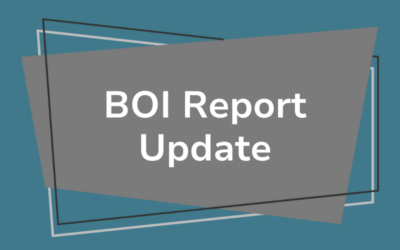A company might request to use an assumed business name instead of its legal name for conducting business. This is more commonly known as a DBA (Doing Business As). In this article, I’ll explain why business owners might want to use an assumed business name, how to get one, and other important details for anyone considering using an alternate name for their company.
Legal Name vs. Assumed Business Name
Legal names:
- A Limited Liability Company’s (LLC) or C Corporation’s legal name is the one that is registered with the state on the entity’s formation documents.
- A Sole Proprietorship’s or Partnership’s legal name is the name of the business’s owner or partners.
Assumed names:
- An assumed business name is a fictitious name that the company registers with the state (or, in some cases, the county) so it can do business under an alternate name.
- States require filing assumed business names because they help disclose to the public who owns the company. An assumed name filing puts the name and its owner’s identity on public record.
- Some states and jurisdictions refer to assumed names as DBAs, fictitious names, or trade names.
- Regardless of the terminology, business owners must comply with their state’s assumed name laws when using one.
Benefits of Using an Assumed Name
- For Sole Proprietorships and Partnerships, filing an assumed name is a cost-effective and easy way to register a business name that’s marketable and memorable without forming an LLC or Corporation.
- It enables the owner of a Sole Proprietorship or partners in a Partnership to open a business bank account to make and receive payments through their company name.
- An assumed name allows LLCs or corporations to operate multiple businesses without forming a separate LLC or Corporation for each business.
Reasons to Use an Assumed Name
- They’re launching a new product line or service offering – Here’s a hypothetical example: a business called Miller’s Lawncare & Landscaping provides on-site mower repair services under the assumed name Pro Lawn Equipment Repair.
- Their legal name is difficult to spell, pronounce, or overly long.
- Their legal name is boring and lacks pizazz.
- They want to use different variations or abbreviations of their legal name. For example, a consulting company with the legal name Anderson, Barnes, and Cole Consulting, Inc. might file the assumed name ABC Consulting.
- They want to engage in e-commerce using their website URL as a business name.
Limitations of Using an Assumed Name
- An assumed name is not a separate legal entity and does not protect from personal liability as an LLC or Corporation does. In the case of Sole Proprietorships and Partnerships, the business owners remain personally liable for debts and claims against their company.
- In most states, an assumed name does not guarantee exclusive rights to the business name.
- Most states require that assumed names are distinguishable from the names of registered business entities in the state. Conducting a business name search is a great starting point for verifying if a name is available.
- Assumed names may not include corporate designators such as a corporation, incorporated, limited, limited liability company, or any abbreviation or derivation of them. States may also have other naming restrictions to consider. Business owners should contact the appropriate state (or county) office or get guidance from an attorney to ensure their intended fictitious name complies with the rules.
How to Get an Assumed Name
Filing for an assumed business name requires completing a form (from the state or county) and paying the applicable filing fee. What states call the filing varies — e.g., assumed name certificate, DBA filing, fictitious name registration, trade name registration, or some version of those names.
Forms and fees vary from state to state and county to county. Business owners may also have to publish a notice in their local newspaper to notify the public that they will use an assumed name. That’s a rule in many states to ensure that people know who owns the business to prevent unscrupulous entrepreneurs with poor reputations from trying to hide behind a fictitious name.
When to File for an Assumed Name
State rules vary, but generally, it’s best to file for an assumed name before using it to conduct business. Moreover, most banks will require proof that an assumed name is registered before opening a bank account with that name. Some jurisdictions will allow a company to use an assumed name for a short period of time before officially filing it.
Risks of Using an Assumed Name Without Registering It
If a business uses an assumed name without registering it or otherwise ignores the state’s statutes, it may face monetary or even criminal penalties. Also, neglecting to have certification to use a fictitious name may mean the business will be unable to enforce a contract or bring a lawsuit in the state. Moreover, a business entity’s owners may find themselves personally liable for contracts that use the assumed name.
Although filing an assumed name does not create a legal entity, it can have legal consequences if you fail to follow the state’s rules. Do your homework by researching the laws in your state and consider talking with an attorney to ensure filing an assumed name is the best option for what you want to accomplish.
Do You Need an Assumed Name?
You can count on CorpNet to handle your filing flawlessly and quickly! Contact us to help you determine if your desired name is available and to prepare and file the registration paperwork in your state.





